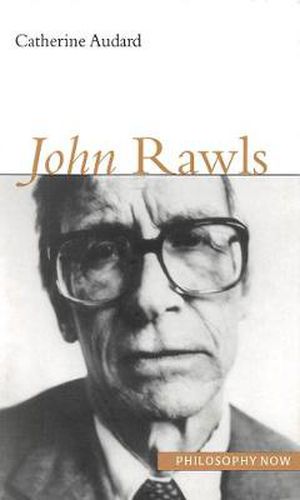Readings Newsletter
Become a Readings Member to make your shopping experience even easier.
Sign in or sign up for free!
You’re not far away from qualifying for FREE standard shipping within Australia
You’ve qualified for FREE standard shipping within Australia
The cart is loading…






This introduction to the work of John Rawls (1921-2002), one of the most influential political philosophers of the twentieth century, provides an authoritative exposition of his central ideas and their contribution to contemporary political thought. The book contextualizes Rawls’ thought by giving a sense of its historical development, which helps understand the intellectual cohesion of his theory. Audard also explains the constant move between ethics and politics that is characteristic of Rawls’ work, which both makes for the richness of his philosophy, but also creates for it a number of major problems. The book begins with the question whether Rawls’ doctrine constitutes a theory of democracy despite its apparently more limited scope. The complex relation between Rawls’s views and utilitarianism are then explored. The following chapters examine Rawls’ claim to reconcile liberty and equality. This involves a detailed analysis of his two principles of justice and his most famous concept, the Original Position Device. The challenge to Rawls’s theory of justice posed by communitarian critiques is then discussed. The final chapters examine the less universalist ambitions of Rawls’ Political Liberalism and contrasts his theory of contemporary democracy with the ideas of Habermas and Charles Taylor.
$9.00 standard shipping within Australia
FREE standard shipping within Australia for orders over $100.00
Express & International shipping calculated at checkout
This introduction to the work of John Rawls (1921-2002), one of the most influential political philosophers of the twentieth century, provides an authoritative exposition of his central ideas and their contribution to contemporary political thought. The book contextualizes Rawls’ thought by giving a sense of its historical development, which helps understand the intellectual cohesion of his theory. Audard also explains the constant move between ethics and politics that is characteristic of Rawls’ work, which both makes for the richness of his philosophy, but also creates for it a number of major problems. The book begins with the question whether Rawls’ doctrine constitutes a theory of democracy despite its apparently more limited scope. The complex relation between Rawls’s views and utilitarianism are then explored. The following chapters examine Rawls’ claim to reconcile liberty and equality. This involves a detailed analysis of his two principles of justice and his most famous concept, the Original Position Device. The challenge to Rawls’s theory of justice posed by communitarian critiques is then discussed. The final chapters examine the less universalist ambitions of Rawls’ Political Liberalism and contrasts his theory of contemporary democracy with the ideas of Habermas and Charles Taylor.